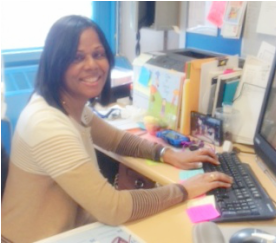Hello, my name is Clara E. Harvey and I am the Asst. Principal here at P.S. /I.S. 111.
I began my educational career with the New York City Department of Education in 2003, after working in corporate America for 10 years.
I am a graduate of Fordham University, holding a bachelor’s degree in history, a master’s degree in social studies 7-12, and a master’s degree in literacy. In 2007, I obtained a master’s degree in school administration from Baruch’s School of Public Policy.
It is my belief that students learn best when their social and emotional needs are met and the diversity of their cultural practices and learning styles are recognized. In order for effective instruction to occur, the school must look at the needs of the whole child. The classroom must be all-inclusive addressing the needs of all learners in setting high expectations and rigorous instruction. The transfer of learning must be purposeful, engage students, clearly align with the mission of the school and its underlying beliefs about how learning occurs best, and develop independent learners that will develop the skills necessary to function in society.
In order for the school’s vision and mission statement to be implemented successfully, all members of the learning community must play a meaningful and active role in the process.
The different stakeholders in the community may have different values and beliefs, but it is the role of the school leaders to identify those values and bring it all together into one vision encompassing and supporting the needs of the various stakeholders in a reasonable and effective manner. There will need to be compromise and negotiation on the part of all constituents in the school community.
One of the most important individuals in the school building other than the students is the teacher. The teacher is central to shaping who our students will become in the future.
As a leader first and foremost my expectation for all of my teachers is to know who their students are as learners. If they do not understand who their student is on all levels, it will hinder their ability to teach. It is not only important that teachers know their students on an academic level but also on a social and emotional level as well. Teachers must know their student’s story.
I believe that I must lead by example. I cannot expect my teachers to be life-long learners, if I am not modeling such expectations. I think that it is important to communicate my vision and goals, and when necessary roll up my sleeves and do the work side by side with my teachers. It goes a long way towards showing teachers that I am willing to do what I am asking them to do.
P.S. 111 is a special place and we welcome all to come and join our diverse learning community.
I began my educational career with the New York City Department of Education in 2003, after working in corporate America for 10 years.
I am a graduate of Fordham University, holding a bachelor’s degree in history, a master’s degree in social studies 7-12, and a master’s degree in literacy. In 2007, I obtained a master’s degree in school administration from Baruch’s School of Public Policy.
It is my belief that students learn best when their social and emotional needs are met and the diversity of their cultural practices and learning styles are recognized. In order for effective instruction to occur, the school must look at the needs of the whole child. The classroom must be all-inclusive addressing the needs of all learners in setting high expectations and rigorous instruction. The transfer of learning must be purposeful, engage students, clearly align with the mission of the school and its underlying beliefs about how learning occurs best, and develop independent learners that will develop the skills necessary to function in society.
In order for the school’s vision and mission statement to be implemented successfully, all members of the learning community must play a meaningful and active role in the process.
The different stakeholders in the community may have different values and beliefs, but it is the role of the school leaders to identify those values and bring it all together into one vision encompassing and supporting the needs of the various stakeholders in a reasonable and effective manner. There will need to be compromise and negotiation on the part of all constituents in the school community.
One of the most important individuals in the school building other than the students is the teacher. The teacher is central to shaping who our students will become in the future.
As a leader first and foremost my expectation for all of my teachers is to know who their students are as learners. If they do not understand who their student is on all levels, it will hinder their ability to teach. It is not only important that teachers know their students on an academic level but also on a social and emotional level as well. Teachers must know their student’s story.
I believe that I must lead by example. I cannot expect my teachers to be life-long learners, if I am not modeling such expectations. I think that it is important to communicate my vision and goals, and when necessary roll up my sleeves and do the work side by side with my teachers. It goes a long way towards showing teachers that I am willing to do what I am asking them to do.
P.S. 111 is a special place and we welcome all to come and join our diverse learning community.

